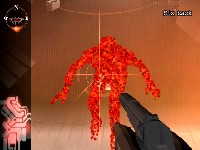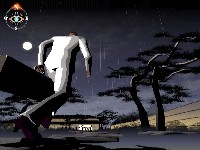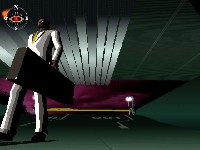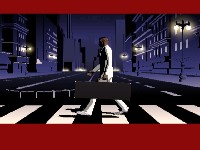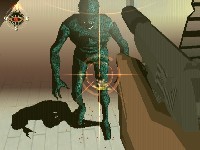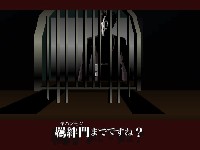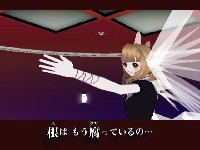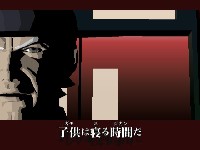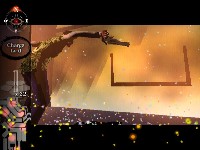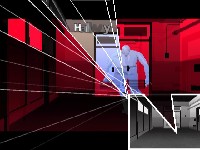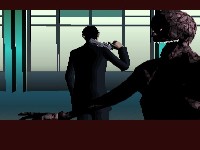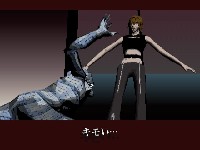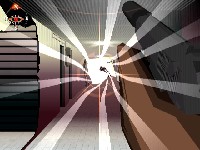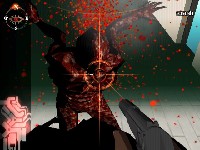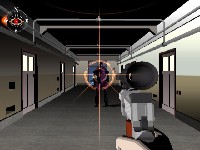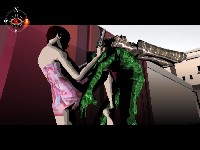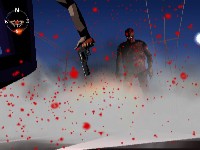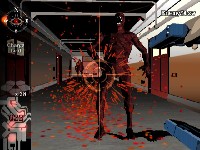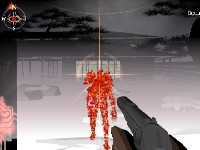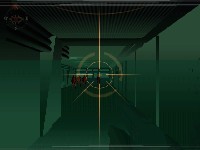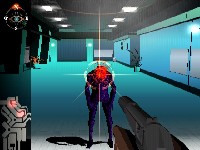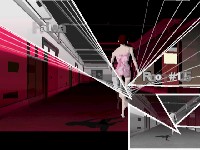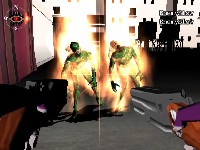Buy 'KILLER 7': GameCube | PlayStation 2
It's rare that reviewers across the board – mainstream reviewers – would be as polarized on a single release as they have been with Killer7. 2.5/5. 9/10. That's a huge discrepancy.
These sorts of results lead me to wonder: What is it about the game that could possibly cause one reviewer to give it a near-perfect score (Dave Halverson's Play magazine), yet another, equally competent journalist, a 50% (in Ziff Davis publication Official Playstation Magazine)? Were two entirely different versions of the game being doled out to reviewers? Of course not. What it all actually comes down to is less the game's fault, but more how the reviewer handled the process of the reviewing itself.
The trouble with Killer7 is that it tries to be much more than a game – which, ironically, makes it much less of one in the process. So what is a videogame journalist supposed to view the final product as? Are we to measure only its merits under a spray of luminol that brightens only such basic features as gameplay and graphics? Or are we to jump at the chance to measure a different kind of product, like Killer7, as the whole of its parts?
As a strident supporter of keeping tight gameplay at the center of every game regardless of the available technology, it nearly pains me to say that I have turned toward the latter option for this review. I do so because Killer7 is the best example so far of what an intelligent multimedia-based console gaming experience should be. The whole of its parts is undeniably thought-provoking and captivating. (Metal Gear Solid 2 be damned, this is how a post-modern gaming experience is done!)
But Killer7 is not for everyone. The experience is akin to a fifteen-hour-long nightmare with shooting gallery segments – not exactly the type of gameplay structure that would grab the more gameplay-oriented of us. If you're not here for the full experience – mostly the art and story – then get out fast.
Case in point: In the beginning, you must shoot a man. You do not know who this man is; he is a silhouette, nothing more. You are a long laser beam, nothing more. You aim, tap "A," and a blaring synth-orchestra hit punctuates the moment as your unknown victim explodes into hundreds of perfect spheres of red, thick blood. Then you hear a rhythmic, looping rumble, and you're watching a blue moon shake in glitchy unison with the sound.
If this doesn't pique your interest in the slightest, Killer7 might not be for you.
The previously described "events" were only the chapter introduction; the rest of the game does is, at best, slightly more coherent. But the sentiment is much the same. As the zombie-like Heaven's Smile laugh maniacally, preparing to charge at you with literally explosive suicidal rage, even the most seasoned post-modern purveyors will wonder why this is happening (aside from the obvious parallel with the current terrorist-riddled climate – a recurring theme throughout Killer7). Why do they laugh? Why are they invisible? Why do they enjoy death so much? Do they really have God on their side?
The questions go on and on.
The most persevering enigma is that of the Killer Seven themselves. Who are "they?" ("Him?" "It?") Are they a group of seven of the most capable assassins on the earth, or are they the powerful personalities of one man, Harman Smith? And why do they so enjoy ingesting the thick blood of their victims to build their own strength?
Who, exactly, is on the side of the "right," "just," "good?" The Heaven's Smile have God, don't they? Where does the Killer7 fit into all this?
To confound matters further, carrier pigeons, a man dressed in a devil suit with a penchant for suspension named Sawaru, a walking corpse with a mid-eighties homosexual sense of style, and countless other supporting cast members give nearly opaque advice at every turn, either bringing light to the overarching story, or torturing the player with their obsessive-compulsive statements (Sawaru: "In the name of Harman..." Masked man: "Tomorrow, it could be you."). Finding meaning in Killer7 does not come without great effort; constantly piecing together every single bit of information is required to discover even a shadow of what is really happening.
Perhaps all of the thought required to piece together for the story seemed like enough of a burden to place upon the player, because the gameplay itself is among the most simplistic to grace a major release this generation. Players move on rails by holding down the A button, turn around with B, and change paths at specific branching points with the analog stick and a tap of the A button. When a crazed chuckle from a Heaven's Smile is heard, the R button is held in to switch to first-person mode, L to turn on a visor in order to see the enemy, and A to fire. That's it.
On a purely mechanical level, there isn't much good to be said about Killer7's control scheme, outside of its ease to pick up and play. It is not the most variable of schemes, leaving little to the imagination of the player. The shooting segments are a case of "aim for weakpoint, shoot weakpoint, absorb thick blood." Everything works without a hitch, but there just isn't much to it.
But when Killer7 is looked at as a coherent work of art, sense can be made of the boiled-down controls, along with the simple puzzles, and often overpowered characters. Killer7 is a videogame because it wants to bring players into the heart of its world. When a character dies, it is the fault of the player. If a Heaven's Smile gets too close, only to be dispatched at just the right moment before setting off its suicidal explosion, it is because of the player. The player is an extension of Harman Smith himself, but with less knowledge of the Killer7 world than that character has.
Most importantly, Killer7 is meant to be felt, seen, heard, and especially thought about. It is condescending to its own gameplay because it has to be; there would be far too much going on otherwise. If Killer7 played more like Resident Evil 4, we would all play the latter game instead. It would be more about exploring environments instead of viewing the world through the lens of its director. The puzzles and shooting sequences are there to keep the player engaged in his or her role as the force behind the Killer Seven. While a great deal of room was still left for improvement, the gameplay there is to be had is still enough to carry the game to the heights it needs to achieve to be considered a "videogame." After all, its entire art-style is that of a cel-shaded game. There's a reason for those polygons; this could have been a hand-drawn/anime-style affair. And because of the fantastic art-direction, Killer7 is one of the most artistically beautiful games ever released.
Dark shadows, bright, blinding lights, strange colors, stark shading, constant shifts in the amount of detail displayed -- Killer7 is a strange and delightful visual experience. The strangeness of the Heaven's Smile never ceases to impress the eyes; the conflicting beauty and macabre; everything there is to see is a treat on the eyes.
Only rarely do technical hiccups get in the way of the immersing style. As if to remind the player that, yes, Killer7 is a GameCube game and not a crazed New Media art piece, clipping is a semi-common error throughout certain segments in the game, including a few that should have been easily caught by the development team and fixed, if only to preserve the integrity of the art. (As the masked man threatens me with his outstretched middle fingers, I want to be shocked by his blatant disrespect, not the faulty, triangular chunk of shading that's glitching in and out PS1-style!)
But, I digress. Killer7 is clearly not the perfect game, in all regards, and a few graphical hiccups do not, by any means, detract from the overall quality of the fantastic multimedia experience.
One aspect of Killer7 is easily what I would consider at least "near-perfection": Sound. I am taking a great risk by saying this, but here goes:
Killer7 has the very best sound direction I have ever encountered in a videogame.
The soundtrack is eclectic enough to be compared to Metal Gear Solid 3, sans production values. Jagged rock jingles punctuate frustrating events. Emotionless yet jazzy interludes drone behind event scenes. Pulsating electronic beats ring, uncalled for, in specific hallways and rooms. A few bars of pleasant folk guitar ring quizzically as puzzles are brought closer to solving. Contact-microphone steel-sheet rumbles and electronic buzzes push through the ambient sound during calm moments, adding to the uneasiness of any quiet period throughout the game (Expecting, at any moment, to hear the shrill shriek of a Heaven's Smile victim.)
Foot-taps change with the surroundings, echoed or muffled. Appropriately shocking bursts of noise assault the ears at the death of one of the Killer Seven. Unreal waves of sound accompany massive bullet blasts, followed by the equally strange swirling of beads of thick blood rising up from the freshly eliminated corpse.
Killer7 sounds just as strange as it looks and feels.
But again, it is not a game for everybody. If you are looking for a quick action fix, do not look to Killer7. It is far too simplistic. If you are looking for a strong narrative, stay away. As intelligent as Killer7 is, it is just random and impenetrable enough to stop left-brained gamers cold. But for those of us looking for something fresh, willing to experience a brave new world of gaming, Killer7 is for us. It is a fully-realized vision, a completely new direction for gaming as a medium.
Above all, Killer7 is a great start for what will hopefully become a style of console gaming that will grow, meet many improvements, and finally show the world that art and videogames can, indeed, be one.
Score: 8.7/10
More articles about Killer7






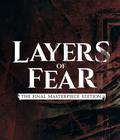






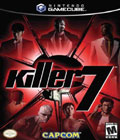 Dive into a dark world of underground assassins in a tale of revenge as Harman Smith, a man who manifests seven deadly personalities into the real world, known as the "killer7".
Dive into a dark world of underground assassins in a tale of revenge as Harman Smith, a man who manifests seven deadly personalities into the real world, known as the "killer7".